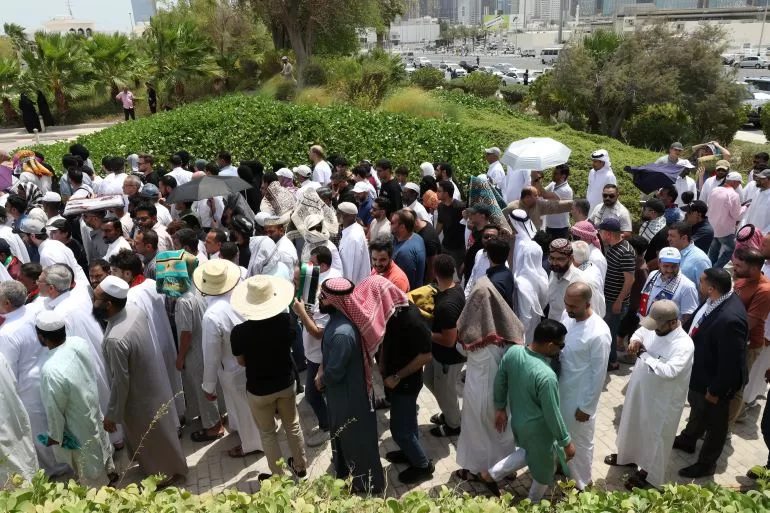Palestinian group calls for ‘day of furious rage’ to coincide with funeral of Haniyeh who was assassinated in Iran.
Funeral ceremonies for Hamas leader Ismail Haniyeh are being held in Qatar after his assassination in Iran deepened fears of a widening regional conflict.
On Friday, thousands of mourners gathered at the Imam Muhammad bin Abdul al-Wahhab Mosque in Doha and performed prayers for the Palestinian group’s political chief, ahead of his burial at a cemetery in Lusail, north of the Qatari capital.
Representatives of other Palestinian factions and members of the public attended the events in the city, where Haniyeh had lived along with representatives from the group’s political office.
![People gather at Imam Muhammad ibn Abd al-Wahhab Mosque in Doha for Friday prayer before the burial of Hamas leader Ismail Haniyeh [Showkat Shafi/Al Jazeera]](https://www.aljazeera.com/wp-content/uploads/2024/08/IMG_4711-1722586179.jpg?resize=770%2C513)
Israel did not directly comment on the killing of Haniyeh and a bodyguard in a predawn attack on their accommodation in Tehran early on Wednesday, but has been accused by Hamas, Iran and others of the attack.
The Hamas leader’s assassination came just hours after Israel struck a southern suburb of Beirut, killing Fuad Shukr, the military commander of the Iran-aligned Lebanese group Hezbollah. Israel has taken responsibility for this attack.
Hamas has called for a “day of furious rage” to coincide with the burial in Doha and encouraged “roaring anger marches … from every mosque” following Friday prayers to protest against Haniyeh’s killing as well as Israel’s ongoing war on Gaza.
Turkey and Pakistan have announced a day of mourning in honour of the Hamas leader.
Iran’s Supreme Leader Ayatollah Ali Khamenei led prayers on Thursday as thousands of mourners paid their respects during a public funeral ceremony for Haniyeh in Tehran. He earlier threatened “harsh punishment” for his killing.
Reporting from Tehran, Al Jazeera’s Dorsa Jabbari said a special committee that includes Iran’s intelligence forces, the Revolutionary Guards and police forces was formed to investigate the assassination, which was “one of the biggest intelligence and security failures in the country’s recent history.”
Haniyeh was playing a key role in talks for a potential ceasefire in Gaza and working with mediators Qatar in months-long negotiations alongside Egypt and the US.
US President Joe Biden said late on Thursday that Haniyeh’s killing had “not helped” the situation and that he was “very concerned” about rising tensions in the region.
The White House said Biden spoke with Israeli Prime Minister Benjamin Netanyahu by telephone on Thursday, promising to defend Israel’s security “against all threats from Iran”.
Qatar’s prime minister said the killing had thrown the Gaza war mediation process into doubt. “How can mediation succeed when one party assassinates the negotiator on the other side?” Sheikh Mohammed bin Abdulrahman bin Jassim Al Thani said on social media platform X.
Qatar has hosted Hamas’s political bureau with the blessing of the United States since 2012 following the group’s closure of its office in Damascus, Syria.

The international community called for calm amid concerns that a concerted retaliation by Iran and its allies Hezbollah and Hamas could trigger an intense regional conflict.
Hezbollah leader Hassan Nasrallah on Thursday said a response was “inevitable” as he addressed crowds of supporters gathered for the funeral of Shukr, the group’s senior commander who was killed in an Israeli strike in Beirut on Tuesday.
Israel warned its adversaries on Thursday that they would “pay a very high price” for any “aggression”.
“Israel is at a very high level of preparation for any scenario, both defensive and offensive,” Netanyahu said in a statement. “Those who attack us, we will attack in return.”
Sami Nader, director of the Levant Institute for Strategic Affairs, told Al Jazeera that the moment was “very delicate” for Iran and its proxies, who were “humiliated” by the killings.
“They need to calibrate the response to recover the deterrence that was [lost] without sliding into an all-out war,” he said.
